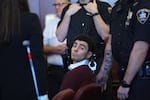
Luigi Mangione appears Monday, Dec. 23, 2024, in New York in Manhattan Criminal Court for his arraignment on state murder and terror charges in the killing of UnitedHealthcare CEO Brian Thompson.
Curtis Means / Pool Photo via AP
The man accused of fatally shooting the CEO of UnitedHealthcare pleaded not guilty on Monday to state murder and terror charges while his attorney complained that statements coming from New York’s mayor would make it tough to receive a fair trial.
Luigi Mangione, 26, was shackled and seated in a Manhattan court when he leaned over to a microphone to enter his plea. The Manhattan district attorney formally charged him last week with multiple counts of murder, including murder as an act of terrorism, in a state case that will run parallel to his federal prosecution.
His initial appearance in New York’s state trial court was preempted by federal prosecutors bringing their own charges over the shooting. The federal charges could carry the possibility of the death penalty, while the maximum sentence for the state charges is life in prison without parole.
Prosecutors have said the two cases will proceed on parallel tracks, with the state charges expected to go to trial first.
One of Mangione’s attorneys told a judge that government officials, including New York Mayor Eric Adams, have turned Mangione into a political pawn, robbing him of his rights as a defendant and tainting the jury pool.
“I am very concerned about my client’s right to a fair trial,” said Karen Friedman Agnifilo.
The city’s mayor and top police official stood among a throng of heavily armed officers last Thursday when Mangione was flown to a Manhattan heliport and slowly escorted up a pier after being extradited from Pennsylvania.
“I wanted to look him in the eye and say you carried out this terroristic act in my city — the city that the people of New York love,” the mayor told a local TV station.
Friedman Agnifilo has accused federal and state prosecutors of advancing conflicting legal theories, calling their approach confusing and highly unusual. “He is being treated like a human pingpong ball between warring jurisdictions here,” she said Monday.
State trial court Judge Gregory Carro responded that he has little control over what happens outside the courtroom, but said he can guarantee that Mangione will receive a fair trial.
Authorities say Mangione gunned down Brian Thompson as he was walking to an investor conference in midtown Manhattan on the morning of Dec 4.
Mangione was arrested in a Pennsylvania McDonald’s after a five-day search, carrying a gun that matched the one used in the shooting and a fake ID, police said. He also was carrying a notebook expressing hostility toward the health insurance industry and especially wealthy executives, according to federal prosecutors.
At a news conference announcing the state charges last week, Manhattan DA Alvin Bragg said the application of the terrorism law reflected the severity of a “frightening, well-planned, targeted murder that was intended to cause shock and attention and intimidation.”
“In its most basic terms, this was a killing that was intended to evoke terror,” he added.
Mangione is being held in a Brooklyn federal jail alongside several other high-profile defendants, including Sean “Diddy” Combs and Sam Bankman-Fried.
Outside the courthouse where Mangione appeared Monday, a few dozen supporters chanted, “Free Luigi,” over the blare of a trumpet.
Natalie Monarrez, a 55-year-old Staten Island resident, said she joined the demonstration because she lost both her mother and her life savings as a result of denied insurance claims.
“As extreme as it was, it jolted the conversation that we need to deal with this issue,” she said of the shooting. “Enough is enough, people are fed up.”
An Ivy-league graduate from a prominent Maryland family, Mangione appeared to have cut himself off from family and friends in recent months. He posted frequently in online forums about his struggles with back pain. He was never a UnitedHealthcare client, according to the insurer.
Thompson, a married father of two high-schoolers, had worked at the giant UnitedHealth Group for 20 years and became CEO of its insurance arm in 2021.
The killing has prompted some to voice their resentment at U.S. health insurers, with Mangione serving as a stand-in for frustrations over coverage denials and hefty medical bills. It also has sent shockwaves through the corporate world, rattling executives who say they have received a spike in threats.